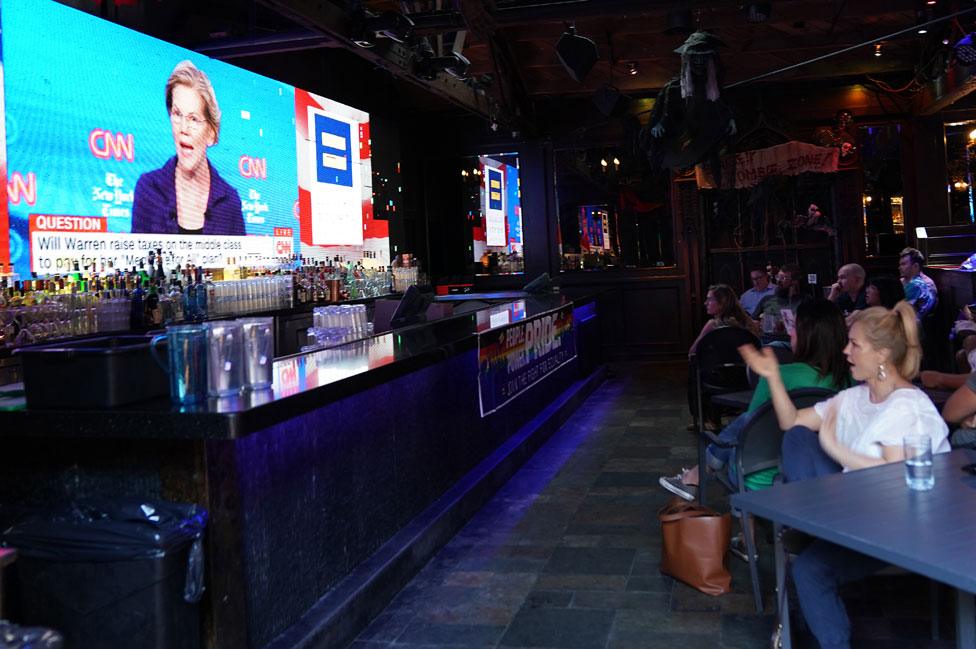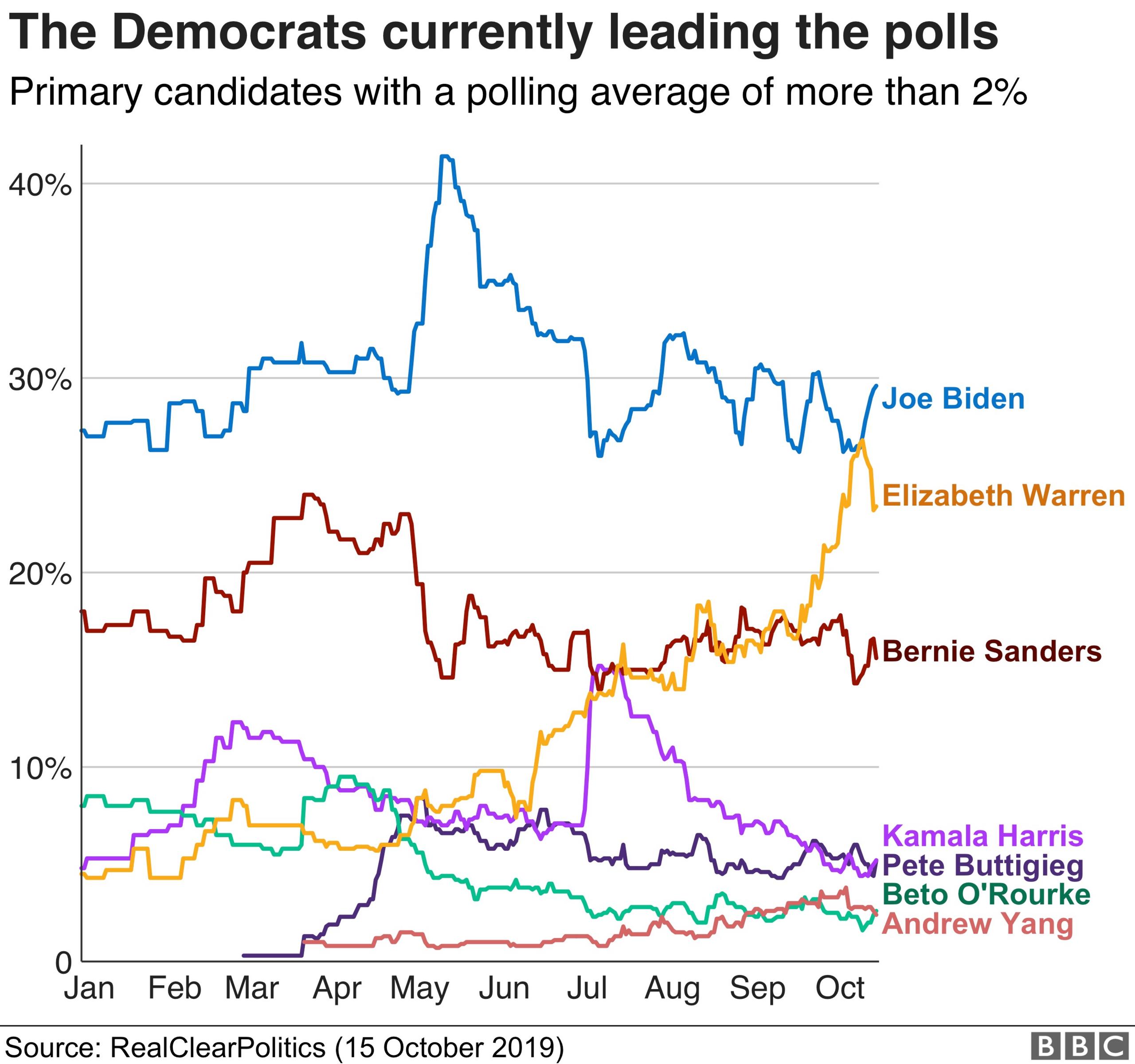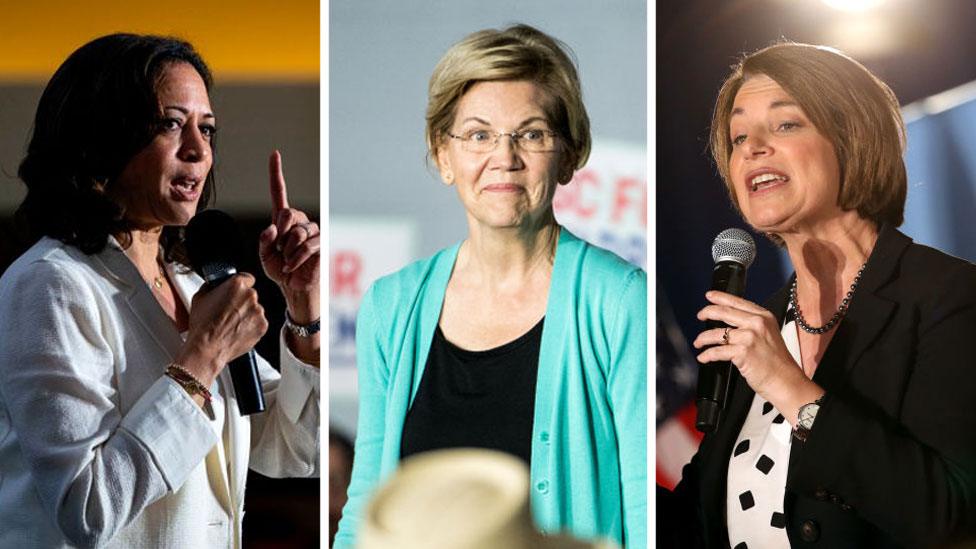Democratic debate: Elizabeth Warren under attack for spending plans
- Published
WATCH: Warren evades questions about tax rises - and her rivals pile on
US Democratic White House front-runner Elizabeth Warren has been fiercely attacked by rivals in a live TV debate.
They accused the senator of refusing to say whether she would raise taxes.
Two other front-runners were also feeling the heat. Joe Biden denied any wrongdoing in Ukraine, while Bernie Sanders sought to allay health doubts after a heart attack this month.
The Democratic winner will take on President Donald Trump, a Republican, in the November 2020 election.
The debate in the electoral battleground state of Ohio was the most crowded so far in the Democratic race - with all 12 White House hopefuls squaring off in the primetime forum.
Snapping at the heels of the pack leaders, Pete Buttigieg - mayor of the town of South Bend in Indiana - California Senator Kamala Harris and Minnesota Senator Amy Klobuchar came out fighting on Tuesday night.
Also on stage were New York entrepreneur Andrew Yang, former Texas congressman Beto O'Rourke, New Jersey Senator Cory Booker, former Obama housing secretary Julian Castro, Hawaii congresswoman Tulsi Gabbard and billionaire activist Tom Steyer.
Time is running out for the lower-tier contenders to make an impression. The Democratic White House race officially begins with the Iowa caucuses on 3 February.
The pack will be whittled down in state-by-state votes until a final candidate is crowned at the party convention next July.
How did Warren come under attack?
Ms Warren found a bullseye on her back after surging to the top of the field over the past two months.
Both Mr Sanders, a Vermont senator, and Ms Warren favour free healthcare for all Americans through "Medicare for All" - a government-run health insurance plan that would transform the US healthcare system. Some analysts have said the system could cost $32 trillion (£25 trillion) over a decade.
But unlike Mr Sanders, Ms Warren has repeatedly avoided stating explicitly whether her version of the policy would raise taxes on working families.
She was pressed on the issue by debate moderators and replied that she would not sign any bill that hiked costs on the middle class.
Mr Buttigieg rounded on her, saying: "You heard it tonight - a yes or no question that didn't get a yes or no answer.
"This is why people here in the Midwest are so frustrated with Washington in general and Capitol Hill in particular."
Even Ms Warren's progressive ally Mr Sanders took a veiled jab, saying: "I do think it is appropriate to acknowledge that taxes will go up."
Ms Klobuchar pounced: "At least Bernie's being honest here and saying how he's going to pay for this and taxes are going to go up."
Mr Biden took a pop at both Ms Warren and Mr Sanders.
"Both are being vague on the issue of Medicare for All," he said. "Now look, here's the deal, come on, it costs 30 trillion dollars!"
Ms Warren did not appear flustered under the repeated attacks, focusing on her policy prescriptions for ending income inequality.
What about the Hunter Biden story?
Mr Biden was asked about Mr Trump's unsubstantiated claims that the former US vice-president improperly tried to aid his son Hunter Biden's business interests in Ukraine.
"My son did nothing wrong," replied Mr Biden, whose once commanding lead in opinion polls has been slipping. "I did nothing wrong."
He was pressed by the debate moderator on whether he made a mistake while he was the Obama administration's point man on Ukraine by allowing his son to serve on the board of a Ukrainian gas company.
Mr Biden replied that he never discussed "a single thing" about Ukraine with his son. Meanwhile, his rivals refrained from attacking him about it.
It was the first debate since congressional Democrats launched an impeachment inquiry into Mr Trump's efforts to pressure Ukraine to investigate Joe Biden.
Every candidate on stage backed the investigation, which may seek to remove the president from office, railing against Mr Trump's "criminality" and "corruption".

It's the largest number on a single stage in this debate series - 12

Warren's weak spot

Elizabeth Warren knew she was going to take some shots now that she's reached the top of the pack. She was not wrong.
Once again, her refusal to acknowledge that her universal healthcare plan raises some taxes was targeted by the more moderate candidates. She doggedly refused to be pinned down, but for once the attacks - particularly from Pete Buttigieg and Amy Klobuchar - felt like they had more bite. She can keep dancing, but her weakness here isn't going away - and could become a real problem in a general election.
Despite this, she had her share of memorable lines. Her early support for Donald Trump's impeachment helped give her answer on the topic - that "impeachment is the way that we establish that no one will be able to break the law over and over again without consequences" - extra punch. Her defence of a wealth tax, saying that she prefers to invest in a generation of Americans and not "protect billionaires", will resonate with many Democrats.
And when Joe Biden spoke about his efforts to get votes for Ms Warren's financial reform legislation in 2009, she pointedly praised Barack Obama - and not the vice-president - for his support. It was a subtle way of prying Mr Biden away from his embrace of Mr Obama's political legacy.

How did age come up?
Mr Sanders was closely watched for signs of fatigue in the three-hour debate after he suffered a heart attack earlier this month.
The oldest contender at 78, Mr Sanders has dropped into third place in the polls.
"I'm healthy," the self-described democratic socialist told a moderator who questioned his fitness. "I'm feeling great."
In a touching gesture, he added: "Let me take this moment, if I might, to thank so many people from all over this country, including so many of my colleagues up here for their love, for their prayers, for their well wishes."
In a major boost for Mr Sanders's support among younger liberals, his campaign aides briefed reporters that he would be endorsed on Saturday by progressive firebrand congresswoman Alexandria Ocasio-Cortez.

A watch party at a bar in West Hollywood, California
Mr Biden was also asked by the moderators about his age - he would turn 80 during his first term as US president.
"One of the reasons I am running is because of my age and my experience," he replied. "With it comes wisdom.
"We need someone to take office this time around who on day one can stand on the world stage, command the respect of world leaders from Putin to our allies."
His reply will be interpreted as an implicit put-down of his younger challengers such as Mr Buttigieg, 37, Mr Yang, 44, and Mr Castro, 45.
How did the candidates spar on gun control?
In one of the most aggressive exchanges of the night, Mr Buttigieg and Mr O'Rourke clashed over firearms policy.
America's gun laws explained in 2017
Mr O'Rourke was challenged by a moderator on his plan to remove assault-style weapons from private ownership under a so-called mandatory gun buyback.
When Mr Buttigieg said Mr O'Rourke did not know how he was going to take weapons off the streets, the Texan implied the young mayor was in thrall to "consultants and the focus groups".
Mr Buttigieg, a military veteran, hit back: "I don't need lessons from you on courage, political or personal."
Mr O'Rourke countered that it was "slap in the face" to victims of gun violence when his idea was disparaged by Mr Buttigieg as "a shiny object".
About 40% of Americans say they own a gun or live in a household with one, according to a 2017 survey., external The right to bear arms is enshrined in the US constitution, and gun control is among the most divisive issues in the country.


Who will take on Trump in 2020?

Election day is still more than a year away but the race to become the Democratic challenger to Mr Trump is already well under way.
The latest polling suggests Ms Warren and Mr Biden are the front-runners, while Mr Sanders is also a popular contender. Many of the the other candidates are relatively unknown outside the Washington DC bubble.
- Published11 September 2019
